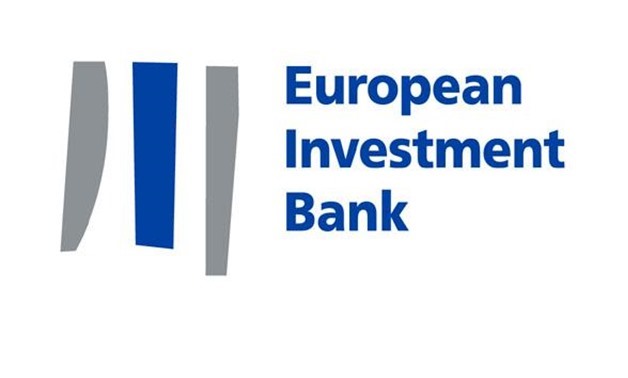
Photo for EIB – Courtesy of Facebook official page
CAIRO – 10December 2018: The European Investment Bank (EIB) announced signing three agreements worth $227.797 million to support business in Egypt.
EIB clarified that it signed two financing agreements for a total amount of €229 million ($260.497 million) to support sanitation and community infrastructure in Egypt.
It added that these investments will contribute to the development of a sustainable modern economy – a key element of the EU-Egypt Partnership Priorities.
“The first agreement signed was the €214 million loan to Kitchener Drain depollution project. This is the first phase of a larger investment program that was identified by an EU financed pre-feasibility study under the supervision of the Mediterranean HotSpots Investment Program II,” EIB stated.
It added that the project will reduce pollution in the 69 km long Kitchener Drain, which extends across the Governorates of Gharbia, Kafr El-Sheikh and Dakahlia in the Nile Delta region.
According to EIB, Approximately 6 million people are expected to benefit from improved and new sanitation and solid waste services as a result of the foreseen investments. By contributing to the depollution of the Mediterranean Sea, the project also supports the objectives of the Clean Ocean Initiative that was recently announced at the World Bank / IMF annual meetings in Bali and contributes to the environmental objectives highlighted in the EU Egypt Partnership Priorities.
Also, the bank signed a Grant Agreement with the Arab Republic of Egypt and the Medium, Small, and Micro Enterprises Development Agency (MSMEDA) for €15 million to support the Community Development Program.
“This grant is funded by the EU under the Neighbourhood Investment Facility (NIF) and will finance investments in community infrastructure to improve living standards for disadvantaged and vulnerable persons living in and around urban centers in several governorates in Egypt,” it said.
The EIB added that projects to be funded bythe grant are expected to include the provision or enhancement of community facilities, including schools, health clinics, and community centres. “They may also comprise access infrastructure such as potable water, waste water, solid waste and minor roads for businesses or residential units. The sub-projects will be implemented by MSMEDA in cooperation with corresponding governorates.”
“The EU bank continues to support a sustainable, modern economy in Egypt and reinforce its economic resilience,” commented the EIB’s President Werner Hoyer after the signatures.
He added: “We are proud to announce that with today’s signatures total EIB financing signed in Egypt since 2012 reaches €5 billion. The projects we finance in Egypt make a substantial difference to people’s lives. The Kitchener Drain depollution project is a good example, it will improve the availability of sanitation services as well as drain infrastructure in the Delta region. In addition, the€15 million grant will finance investments to improve living standards of disadvantaged and vulnerable persons living in and around urban centres in Egypt.”
Meanwhile, EIB has signed an agreement to invest $ 11.3 million in Sawari Ventures Fund, a regional venture capital fund investing in growth and seed stage innovative businesses in Egypt, Tunisia and Morocco.
The bank said that this investment will contribute to the modernization of the economy by encouraging entrepreneurship, in line with the EU-Egyptian Partnership Priorities. Moreover, it is the first EIB operation under the Risk Capital Facility of the Economic Resilience Initiative.
The bank added: "The EIB investment is the first commitment to a venture capital fund focused on Egypt.”
As per this fund, the bank will provide access to needed risk capital to support early and growth stage innovative start-ups and SMEs in Egypt, Tunisia and Morocco that have the potential to scale rapidly and grow regionally boosting the local tech ecosystem.
It will also contribute to knowledge transfer, and will enhance competitiveness of innovative sectors by investing in seed stage companies through a local accelerator.
“The support provided to local SMEs and dynamic start-ups is expected to contribute to economic growth, increase economic resilience and create opportunities, especially for youth,” it noted.
The fund included investors of CDC (UK), Proparco (France) and DGGF (Netherlands), besides theEIB that contributes to the fund by $35 million out of $50 million.
“We are proud to invest in Sawari Ventures Fund, which will provide smart finance to innovative start-ups and high growth companies. We are confident that Egyptian technology start-ups can play an important role in creating jobs and modernizing the Egyptian economy thanks to their great ideas and innovation potential,” Hoyer said.
"We are convinced that equity investment in knowledge economy companies is a huge untapped opportunity in North Africa and we are excited that top tier DFIs like EIB, CDC, DGGF and Proparco share that vision with us," Wael Amin, partner at Sawari Ventures,said.
According to the statement, Sawari is a leading venture capital firm based in Cairo and is among the pioneers of developing the entrepreneurial ecosystem in Egypt. It established the Greek Campus (tech hub), Flat6Labs (seed stage investment vehicle) and Sawari Ventures, one of the first venture capital firms in Egypt.
The statement noted that the EIB investment is funded under the bank’s Economic Resilience Initiative Risk Capital Facility (ERI RCF). The facility seeks to foster private sector development and job creation through investments in venture capital and private equity funds.

Comments
Leave a Comment